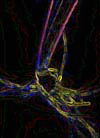

|
call for submissions archive:j_spot is an interdisciplinary electronic journal focusing on a wide range of intersections between theory, politics, culture, and social justice. In light of contemporary political and intellectual conditions in late capitalist society, j_spot aims to expand the space for interdisciplinary critique, innovation, and originality. Already situated in the rapidly evolving nexus of technologically mediated social and political change - a transformative nexus which itself must not escape critique - j_spot aims to give free rein to the crucial, critical energies that aim beyond a deadly acceptance of the status quo. j_spot is currently soliciting work.
In addition to substantial research papers, we invite creative submissions, review work and
pieces that challenge traditional academic form.
Issue no. 2: m a t e
r i a l / b o d i l y / s t r a t a Issue no. 3: Ethics
and Debt (or, Debt to the Other) "Open-Strike!" a j_spot special issue Teaching assistants, contract faculty and graduate assistants of the Canadian Union of Public Employees 3903 at York University, have recently returned—victoriously—to their academic work after a three-month strike. In an increasingly right-wing political climate the success of the strike announces hope and the efficacy of political praxis. This profound event has affected many people in a variety of ways, materially, bodily, ideologically, etc., and truly calls for testimony. j_spot, the Journal of Social and Political Thought, is pleased to announce a special open strike' issue. We aim to provide a forum for strike commentary of all forms: critical analysis, social and political theory, email threads, photographs and other art-making, documents of actions, hypertext, and personal reflection. While the recent CUPE 3903 strike is the impetus behind this call, as are labour issues related to the York University Faculty Association strike of 1997 and the recent action at Carleton University in Ottawa, we are also interested in theoretical reflections on the state and status of the university as a pedagogical site in relation to critical contemporary realities of education and academic work. We encourage submissions that consider a larger context. What are the exigencies of the current situation at your university? In relation to your political system? How do labour disputes, faculty and student movements, government pressures, departmental administrations, or other social and political forces impact upon the delivery and experience of education? Please forward submissions as soon as possible to j_spot@yorku.ca. In order to create an effective response, the special "Open-Strike!" issue of j_spot will be posted online as soon as it reaches a critical mass. "Open-Strike!" will not be peer-refereed in the manner of other issues of the journal, but the journal's editorial collective reserves the right to vet and edit articles as appropriate. Regular submissions for peer review are still being received. All submissions for "Open-Strike!" should be sent to j_spot@yorku.ca, preferably as a WordPerfect, Microsoft Word, or html file
attachment.
Periodically, so to speak, j_spot will issue calls for submissions on a specific topic or theme. Articles should not normally exceed 30 pages of double-spaced text, including endnotes, although longer pieces will be considered. In order to facilitate electronic presentation, all citations must be formatted as endnotes. Submissions should be emailed to j_spot at SPoT@Yorku.ca as an attachment or plain-text. Submissions will be blind-refereed by a panel of peers, consisting of at least one faculty member. Referees' comments will be sent to the author within a period of three months. Authors may be asked to revise their submissions in consonance with recommendations by the peer panel. Editors may make minor revisions for style, space, or add hyperlinks, media and images. Final decisions regarding acceptability for publication in j_spot rest with the Editorial Board. All correspondence should be directed to j_spot Editorial Board at j_spot email address: SPoT@YorkU.Ca. Paper submissions (except for final versions, see below) are discouraged, but hard correspondence may be mailed to j_spot We ask that final versions of papers accepted for publication be submitted both in hard copy and on disk. If an article includes artwork, or figures, authors must submit camera-ready copy or electronic media with the final draft. We welcome short sound or video files which may be incorporated into the articles published on our website. Finally, for co-authored works, all authors must submit in writing signed statements attesting to their degree of involvement in the research and writing of the finished paper.  [ Social and Political Thought main page ] |